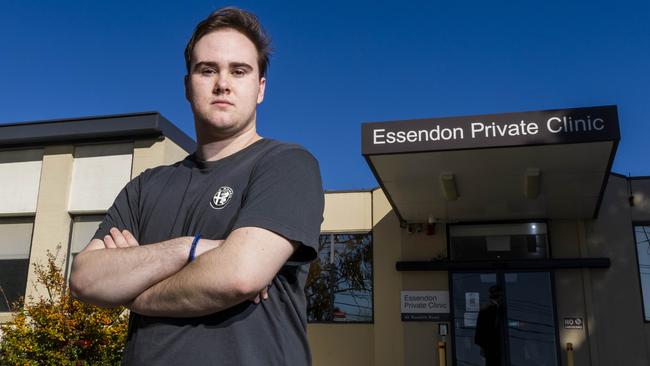Teens mentally scarred by Covid-19 lockdowns, report finds
A landmark new report details the pandemic pain facing teenagers during Covid-19 lockdowns, with girls most at risk.

At his lowest ebb during lockdown, high school student Oslo Fox was admitted to hospital after a mental health breakdown.
Left home alone to study for his Victorian Certificate of Education while his single mother worked at the coalface of the Covid-19 pandemic as a midwife, the Year 12 student struggled with online study and social isolation.
A dozen classmates dropped out of school, unable to keep up with home schooling during the world’s longest lockdown in Melbourne. “It was the isolation and not knowing how to teach myself everything, and I felt disconnected with the world around me,’’ Oslo, now 19, said of his Year 12 experience when the pandemic struck in 2020.
“My school didn’t really have the resources or technological knowledge to continue classes on Zoom. People kept dropping out of class – we had 15 doing the VCE at the start of the year and only three at the end.
“I think (the lockdowns) were really harmful to young people at a critical time of their lives.’’
After repeating Year 12 last year, Oslo will soon start a teaching degree so he can help young people with learning difficulties.
His pandemic pain is reflected in a new Mission Australia and Orygen survey of 20,000 teenagers, which reveals the pandemic’s toll on teens’ physical and mental health, as well as their financial and housing stability, during 2021.
The survey of 15 to 19-year-olds, undertaken between April and August when Sydney and Melbourne were in full lockdown, detected that half the students were suffering mental health problems.
Girls and gender-diverse teenagers were nearly twice as likely as boys to experience mental illness during lockdowns, based on the Kessler Psychological Distress Scale used by doctors to diagnose depression and anxiety. Two-thirds of girls and just over half the boys said the pandemic had harmed their education.
Mission Australia spokeswoman Marion Bennett said mental health problems had risen 14.2 per cent among teenage girls and 2 per cent among boys since a similar survey in 2012. “Tragically, more young men suicide each year than young women and we should not ignore mental health in young men,’’ she said.
Nearly half of all teenagers said the pandemic had affected their physical health, and one in three said it had damaged relationships with friends and family. Eighty per cent said they had felt lonely in the month before the survey.
“Loneliness is strongly associated with mental ill-health, in particular with anxiety, depression, self-harm and suicidal ideation,’’ the Mission Australia report states. “There is an urgent need to increase capacity and support of the mental health workforce to ensure young people can access the high-quality mental health care they require.’’
The survey shows higher rates of distress in the lockdown states of Victoria and NSW. Two-thirds of teenagers in NSW and nearly half in Victoria reported mental health problems as a result of Covid-19, compared to just over a third in Queensland and 43 per cent in South Australia.
The survey found many students struggled with “technological difficulties, poor internet access, difficulty keeping up with the content, and having caregivers unwilling or unable to step into the role of education’’.
“Remote schooling also led to increased time in the home environment, which for some young people resulted in increased familial conflict, family violence or a simply less-than-ideal environment for their studies,’’ the report states. It warned of long-term impacts as the pandemic deprives teenagers of “developmental milestones such as a first job, moving out of home or first romantic relationships’’.
The report – prepared jointly with youth mental health organisation Orygen, the provider of Headspace services – calls for the extension of Medicare rebates for 20 sessions of psychological sessions a year. The number of subsidised sessions was doubled during the pandemic, but is due to revert to 10 a year from July.
Readers seeking support and information about suicide prevention can contact Lifeline on 13 11 14




To join the conversation, please log in. Don't have an account? Register
Join the conversation, you are commenting as Logout